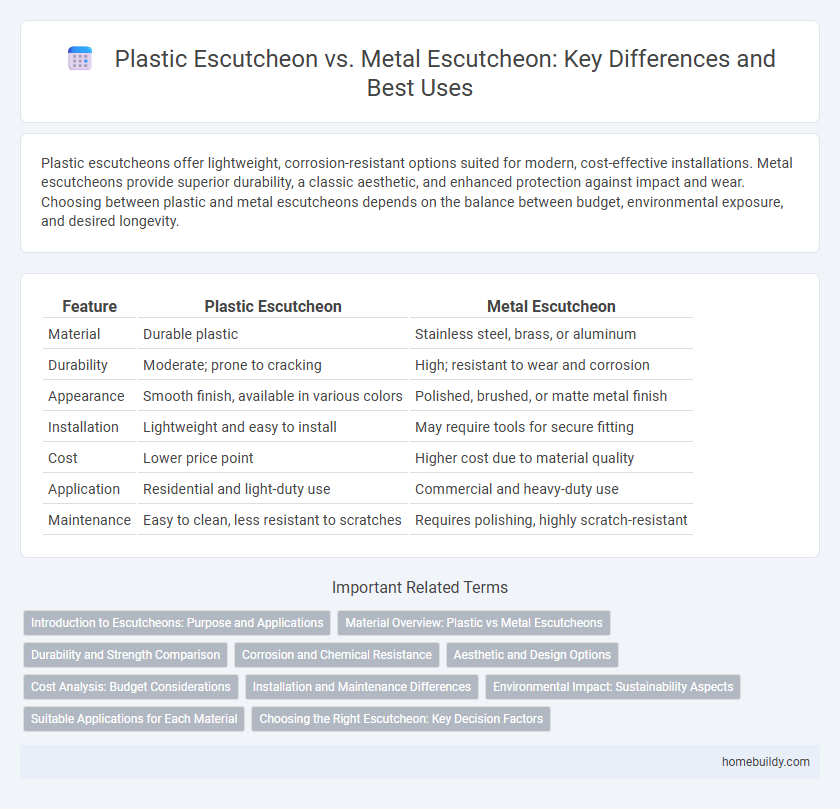Plastic escutcheons offer lightweight, corrosion-resistant options suited for modern, cost-effective installations. Metal escutcheons provide superior durability, a classic aesthetic, and enhanced protection against impact and wear. Choosing between plastic and metal escutcheons depends on the balance between budget, environmental exposure, and desired longevity.
Table of Comparison
| Feature | Plastic Escutcheon | Metal Escutcheon |
|---|---|---|
| Material | Durable plastic | Stainless steel, brass, or aluminum |
| Durability | Moderate; prone to cracking | High; resistant to wear and corrosion |
| Appearance | Smooth finish, available in various colors | Polished, brushed, or matte metal finish |
| Installation | Lightweight and easy to install | May require tools for secure fitting |
| Cost | Lower price point | Higher cost due to material quality |
| Application | Residential and light-duty use | Commercial and heavy-duty use |
| Maintenance | Easy to clean, less resistant to scratches | Requires polishing, highly scratch-resistant |
Introduction to Escutcheons: Purpose and Applications
Plastic escutcheons offer lightweight, corrosion-resistant solutions ideal for indoor and moisture-prone environments, while metal escutcheons provide superior durability, strength, and aesthetic appeal for heavy-duty or outdoor applications. Both types serve the primary purpose of covering and protecting the area around keyholes, door handles, or pipe penetrations, preventing damage and enhancing the overall finish. Selection depends on factors such as environmental exposure, mechanical stress, and design preferences, with plastic favored for budget-friendly, flexible installations and metal for robust, long-lasting protection.
Material Overview: Plastic vs Metal Escutcheons
Plastic escutcheons offer lightweight, cost-effective protection against dust and moisture with resistance to corrosion and easy installation, making them ideal for indoor applications. Metal escutcheons, typically made from stainless steel, brass, or aluminum, provide superior durability, impact resistance, and a premium finish suited for high-traffic or outdoor environments. The choice between plastic versus metal escutcheons depends on factors such as environmental exposure, mechanical stress, aesthetic preference, and budget constraints.
Durability and Strength Comparison
Metal escutcheons offer superior durability and strength compared to plastic escutcheons, as they resist impact, wear, and environmental factors more effectively. Plastic escutcheons, while lightweight and corrosion-resistant, are prone to cracking and deformation under heavy stress or extreme temperatures. Choosing metal escutcheons ensures long-lasting performance and enhanced security in high-traffic or demanding applications.
Corrosion and Chemical Resistance
Plastic escutcheons offer superior corrosion resistance as they are impervious to rust and chemical degradation, making them ideal for environments with moisture or exposure to harsh chemicals. Metal escutcheons, while durable and strong, are susceptible to corrosion if not properly coated or maintained, especially in acidic or saline conditions. Selecting plastic escutcheons enhances longevity and reduces maintenance costs in corrosive settings compared to traditional metal counterparts.
Aesthetic and Design Options
Plastic escutcheons offer greater versatility in aesthetic and design options due to their ability to be molded into intricate shapes and available in a wide range of colors and finishes, allowing seamless integration with modern interiors. Metal escutcheons provide a more traditional and durable appearance, often featuring polished or brushed finishes that enhance classic or industrial design themes. Designers often choose plastic for customization flexibility, while metal is preferred for its premium, timeless look and robust texture.
Cost Analysis: Budget Considerations
Plastic escutcheons offer a cost-effective solution with lower upfront expenses and reduced manufacturing costs compared to metal escutcheons, making them ideal for budget-conscious projects. Metal escutcheons, such as those made from stainless steel or brass, typically have higher material and production costs but provide greater durability and long-term value. Evaluating the total cost of ownership, including installation, maintenance, and replacement frequency, is essential for an accurate budget assessment between plastic and metal escutcheons.
Installation and Maintenance Differences
Plastic escutcheons offer easier installation due to their lightweight design and flexibility, allowing for quick adjustments without specialized tools, while metal escutcheons often require precise alignment and additional hardware for secure mounting. In terms of maintenance, plastic escutcheons are more resistant to corrosion and can be cleaned with mild detergents, whereas metal escutcheons may need regular polishing to prevent tarnish and rust, particularly in humid environments. The choice between plastic and metal escutcheons impacts installation time and long-term upkeep based on material properties and environmental exposure.
Environmental Impact: Sustainability Aspects
Plastic escutcheons often contribute to environmental concerns due to their reliance on non-renewable fossil fuels and their difficulty in biodegrading, leading to prolonged landfill lifespan. Metal escutcheons, particularly those made from recyclable materials like aluminum or stainless steel, offer enhanced sustainability through recyclability and longer product life cycles. Choosing metal escutcheons over plastic aligns with eco-friendly building practices and reduces overall carbon footprint in construction projects.
Suitable Applications for Each Material
Plastic escutcheons are ideal for residential interior doors and lightweight fixtures where moisture resistance and cost-effectiveness are priorities. Metal escutcheons excel in commercial settings and high-traffic areas due to their durability, impact resistance, and superior aesthetic appeal. Choosing between plastic and metal escutcheons depends on environment demands, durability requirements, and design preferences.
Choosing the Right Escutcheon: Key Decision Factors
Choosing the right escutcheon depends on factors such as durability, aesthetics, and cost. Plastic escutcheons offer lightweight, corrosion-resistant options ideal for indoor use and budget-conscious projects, while metal escutcheons provide superior strength, longevity, and a more polished appearance suitable for high-traffic or outdoor applications. Consider compatibility with existing fixtures, environmental conditions, and maintenance requirements to ensure the escutcheon meets both functional and design needs.
plastic escutcheon vs metal escutcheon Infographic

 homebuildy.com
homebuildy.com